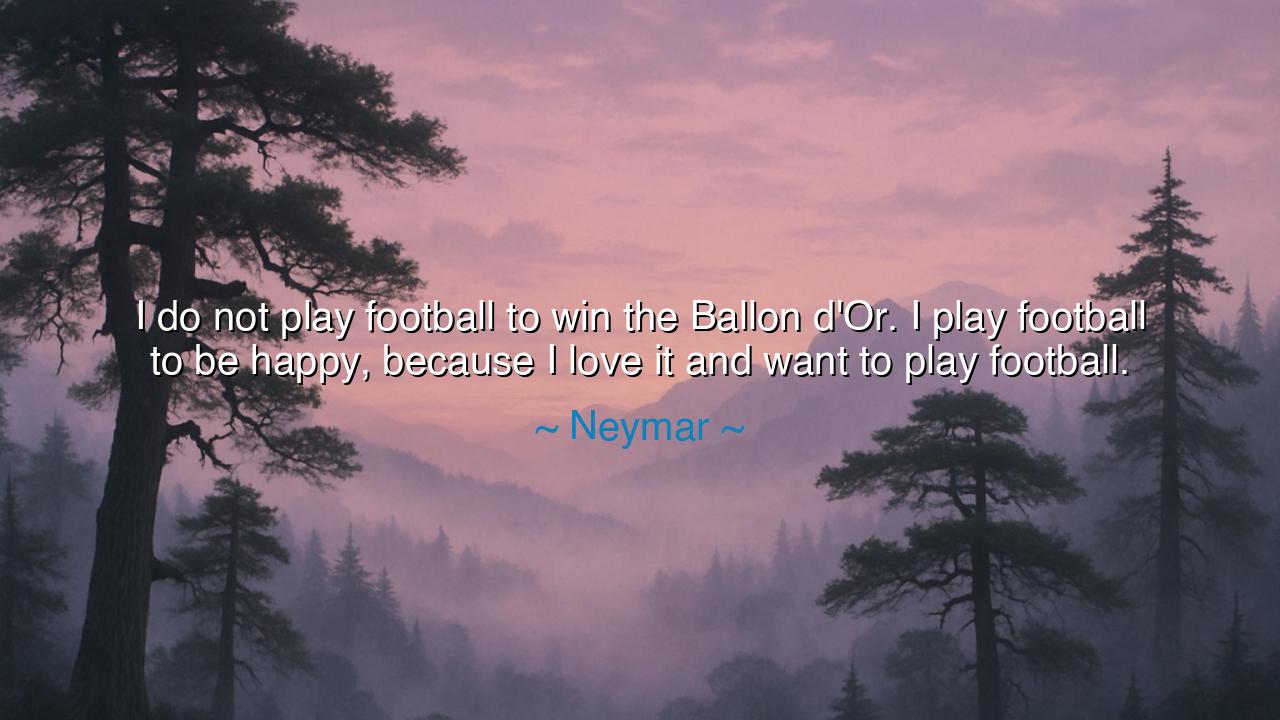
I do not play football to win the Ballon d'Or. I play football to
I do not play football to win the Ballon d'Or. I play football to be happy, because I love it and want to play football.






"I do not play football to win the Ballon d'Or. I play football to be happy, because I love it and want to play football." Thus spoke Neymar da Silva Santos Júnior, the artist of the beautiful game, whose feet dance with joy and whose spirit carries the music of Brazil’s sunlit fields. In these words lies a truth far deeper than sport—a truth that reaches into the heart of purpose itself. For Neymar, football is not a path to glory, but a celebration of life; not a ladder to fame, but a song of freedom. His declaration is a gentle rebellion against a world obsessed with trophies, titles, and praise. It is the cry of the soul that remembers: joy, not ambition, is the highest art of living.
The origin of this saying lies in the golden world of modern football, where every player is weighed by statistics, measured by medals, and compared by fans. The Ballon d’Or, the most coveted individual award in the sport, symbolizes greatness and recognition—but Neymar’s words shine like a flame in the midst of this glitter. He reminds us that beyond the applause, beyond the cameras and contracts, there is something sacred—the pure love of the game itself. This is the same love that drives a child to kick a worn-out ball in the dust, smiling under the open sky. That love is the essence of football, and of life.
"I play football to be happy," says Neymar. In that statement, happiness is not an afterthought—it is the goal itself. The wise will see that this teaching extends beyond sport to every human endeavor. When one works only for reward, one becomes a servant to comparison; but when one works out of love, one becomes free. The one who chases recognition may gain applause, but the one who pursues joy gains peace. Neymar’s words remind us that passion without love turns hollow, and ambition without heart becomes poison. True greatness is not found in the golden statue, but in the living moment—the joy of creating, giving, and being.
Consider the story of Pelé, another son of Brazil, whose name became immortal not merely for his skill, but for his love of the game. As a child too poor to own shoes, he crafted a football from rags and dreams. When he played, he played with laughter, with beauty, with grace—so much so that even his rivals honored him. He did not play for power or wealth; he played because it made him feel alive. That love transformed him into a legend, just as Neymar’s devotion keeps his artistry alive today. This is the law of joy: those who act from love achieve not just success, but immortality of spirit.
Neymar’s message carries a hidden wisdom of balance. In the world of competition, one must strive, but not be consumed; one must desire victory, yet not lose one’s soul to the chase. The true player, like the true artist, gives his best not because he must prove himself, but because creation itself is the reward. The applause fades, the trophies rust, but the memory of joy endures. As the philosopher said, “The man who loves what he does will never work a day in his life.” So too, the athlete who plays for love will never tire of his field, even when the world forgets his name.
There is also a deeper spiritual truth hidden in Neymar’s words: that joy is divine. To do what you love with all your heart is an act of worship. When the heart moves in harmony with its passion, the soul draws nearer to God. Whether one is a farmer, an artist, a mother, or an athlete, the path of joy is the path of truth. The ancients taught that happiness is not something you pursue—it is what you live when your soul and your purpose are one. Neymar’s words echo this ancient wisdom, reminding us that fulfillment is not found in praise, but in presence.
So, my listener, learn from this teaching: do what you love, and do it with all your heart. Do not chase the golden prizes of the world, for they are fleeting shadows. Chase instead the light within—the joy that moves through your hands, your voice, your craft. Whether your field is a pitch, a desk, or a workshop, let love be your motive, and happiness will follow. Work not for recognition, but for the song your soul sings when it moves freely.
For in the end, Neymar’s wisdom is not about football alone—it is about life itself. The Ballon d’Or will gather dust; joy will remain eternal. When we live for love, we transcend victory and defeat alike. Our lives, like his play, become art—vivid, fleeting, and filled with light. So whatever you do, do it as Neymar plays: with full heart, with freedom, with love—and in that sacred joy, you will find the truest form of greatness.






AAdministratorAdministrator
Welcome, honored guests. Please leave a comment, we will respond soon